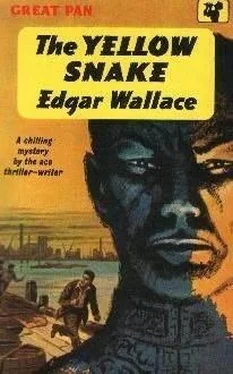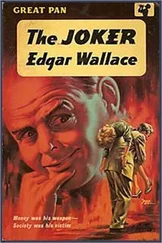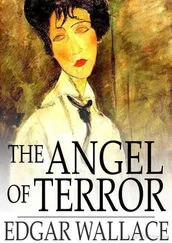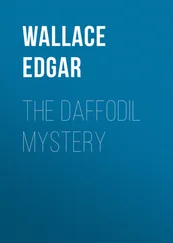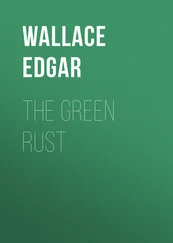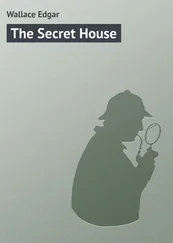Presumably his view was accurate, for the hoses did not come back. Again Fing-Su’s voice:
“Let Mr Bray come out; I’ll talk with him,” he said. “But he must come without arms.”
There was a brief consultation, and Joe surrendered his pistols to his partner and stepped out upon that wet deck.
Fing-Su was standing in the cover of a big bale of Manchester goods, a revolver in his hand.
“Put your gun down, you five-cash Chink!” snarled Joe. “And stop theatre playin’ for once in your life, you poor heathen!”
Fing-Su slipped the pistol into the holster at his side.
“Mr Bray,” he began, “there is no need for recriminations–-“
“Cut out all that college talk, you dam’ coolie thief!” said the old man. “Put this ship about and save your skinny neck from the rope!”
Fing-Su smiled.
“Unfortunately, that is impossible,” he said. “We have dropped the pilot, figuratively and literally–-“
“Quit talking like a Rhodes scholar!” roared Joe, and suddenly broke into voluble Chinese, which is a language peculiarly designed for one who desires to be offensive. Fing-Su listened unmoved to the torrent of abuse, and, when Joe had talked himself out of breath:
“We are wasting time, Mr Bray. Persuade your friends to give up their weapons, and no harm shall come to them. Otherwise, I can starve you out. I have no desire to hurt Joan–-“
“Miss Bray,” snapped Joe, his face crimson with fury. Chinese came naturally to Joe, who had lived most of his life in the country, and the coolies grouped around Fing-Su who understood the language shuddered as they listened. But he might have been passing the most delicate compliments for all the notice the Chinaman took.
He was wearing semi-nautical attire: white duck trousers, a blue reefer coat with innumerable gold rings about the cuffs, and a large officer’s cap around which ran a broad band of gold braid.
“You are a very foolish and vulgar man,” he said calmly. “But it is not for me to reproach you with your lack of breeding. Go back to your friends and deliver my messages.”
For a second it looked as though Joe Bray had a personal message of his own to deliver with his great shoulder-of-mutton fist, but Fing-Su’s revolver covered him, and with a final flow of vituperation he made his way back to his companions in distress.
“He’s got a dozen armed men with him,” he reported, “and he’s going to starve us out. Cliff, when I think of how easy I could have smothered that kid when he was a baby, I almost give up talkin’ to myself!”
“Is Fing-Su in charge of the ship?”
“There’s a captain,” said Joe. “A coon—he’s got up like the Darktown Band, with gold lace an’ everything. But he’s nobody. The big noise is Fing-Su.”
“Mr Bray, who was the man that was brought to the ship at the same time as I?” asked Joan, and they learnt for the first time that there was yet another prisoner on the Umveli .
Clifford agreed that it was hardly likely to be Spedwell. He had his own suspicions, but as it happened they were wrong, for Ferdinand Leggat lay in a deep pit that had been dug under the factory wall by lantern light.
CHAPTER THIRTY-SEVEN
Whilst they held a council of war, Fing-Su went up to his cabin, and on his instructions they brought the pitiable wreck of a man from the dark hold where he had been stowed. Stephen Narth, in the ruined finery of the night before, collarless, grimy of face, unshaven, might well have passed unrecognized by his nearest friend. A shuddering night had had its effect upon him. But he was sane enough, though, as the Chinaman saw, on the verge of a breakdown.
“Why did you bring me on this ship?” he asked hollowly. “That’s not playing the game, Fing-Su. Where is that swine Spedwell?”
Fing-Su would have given a lot to have been able to answer.
Spedwell had escaped, but self-interest would keep him silent. He had always hated Spedwell, with his air of mastership and his superior smile; hated him worse than the drunken Leggat. Spedwell had been a useful teacher; from him the Chinaman had imbibed certain vital knowledge. He was a very receptive man, gifted by nature with a rapid acquisition of learning; though in his collegiate days he had not touched military studies, he had learnt much from Spedwell in the year of their acquaintance.
“I haven’t the slightest idea where he is,” he said, “and I shall never forgive him for the death of poor Leggat.”
Narth stared at him.
“Then it was his idea?”
“Entirely,” said Fing-Su gravely. He was a glib and plausible liar, and Narth was in a state of mind when he was prepared to accept any version of the horror that exculpated himself.
In a few sentences Fing-Su gave an account of the initiation which brought a moderate comfort to the conscience-stricken man. And then the Chinaman broke his important news.
“Here? On board? Joan?” gasped Narth. “But how did she come here? And what is Lynne doing on board this ship?”
“That is what I want to know,” said Fing-Su rapidly. “Go down and talk to them. Point out the folly of resistance; promise them on my word that no harm shall come to them, and that I will give them the best accommodation on the ship and land them at Bordeaux, if they will agree to give me no further trouble.”
He elaborated this message at length, and five minutes later Clifford Lynne, from his observation post, saw a dilapidated figure stagger into the cabin and recognized him. So this was the moaning stranger! What had happened to Leggat? he wondered.
He listened in silence to Stephen’s proposal, then shook his head.
“I’d sooner take my chance with a life-sized shark,” he said. “Go back to Fing-Su and tell him that he’ll neither drown us out nor starve us out, and that the day we touch land, and I am free, he will be a prisoner waiting his trial for murder.”
“What’s the use of quarrelling with him?” wailed Narth.
His nerve had gone. Never a strong man, he was a pitiable snadow of the man Clifford had known.
“Is Leggat on board?” asked Clifford, as he remembered.
Narth shook his hanging head and began to whisper something that only the South African’s keen ears caught.
“Dead?” he said incredulously. “Did Fing-Su kill him?”
But before he had ended the question, Stephen Narth had run out of the room like a man demented.
Their position was a perilous one. Already the land was slipping out of view, and unless a miracle interposed there was no alternative between starvation and surrender—and what surrender would mean to Joan Bray, Clifford could guess.
Immediately after Stephen Narth’s departure the door to the alleyway had been closed and locked and, at Willing’s suggestion, the heavy deadlights which covered the portholes were dropped and screwed into their places. This deprived them of a view of the forepart of the ship and curtailed the air supply, but the cabin was bearable, especially now they had got rid of the yellow Amah.
At this moment of supreme danger Clifford could only wonder at the calm and serenity of the girl. She was, it seemed, the most cheerful of the party, and although the pangs of hunger were beginning to make themselves felt, she neither complained nor, by so much as a look or gesture, added to the unhappiness of the party.
The prospect of any prolonged stay in this confined space was an appalling one. Then he thought of the girl. Happily they would not be short of fresh water, for that in the little shower which had been fixed in the washing-place was fresh, if a little brackish. Clifford tried the inner bulkhead door, but it was unyielding.
“It probably leads to the officers’ quarters,” said Willing.
Читать дальше
